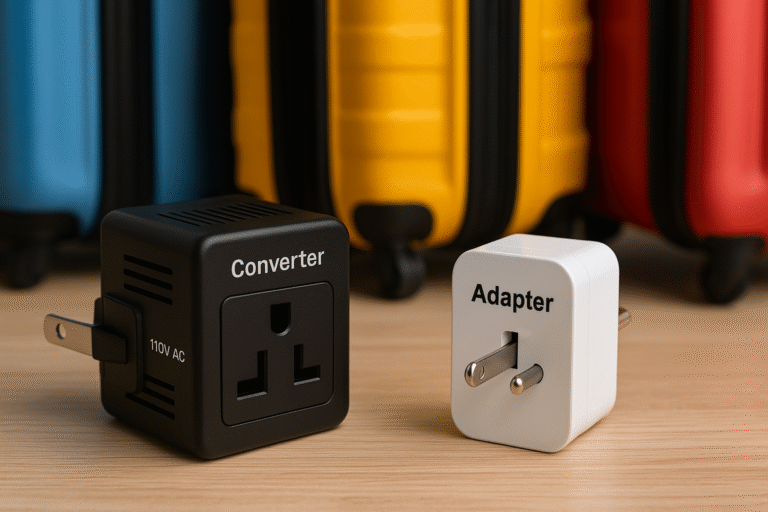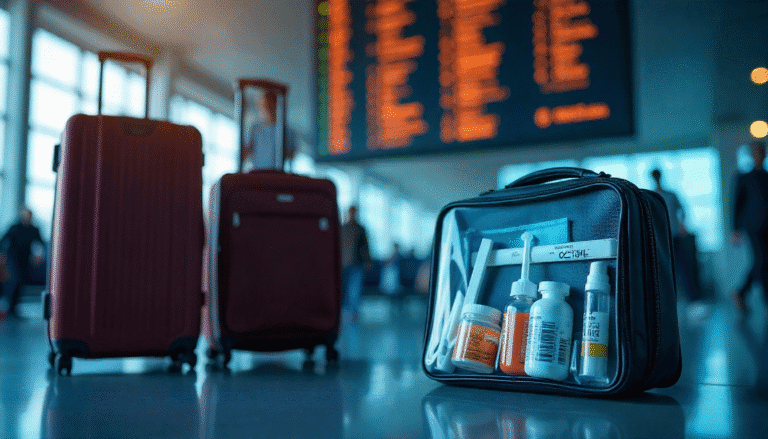Can TSA Take Your Medication? Know Your Rights

Can TSA take your medication? It’s a question that crosses the minds of many travelers, especially those who rely on daily prescriptions or life-saving medications. The last thing you want is to arrive at the security checkpoint and be told that your medication is subject to additional screening—or worse, confiscated.
The good news? TSA has clear guidelines for traveling with prescription and over-the-counter medications. But misunderstandings and inconsistent enforcement at security checkpoints can leave travelers confused about what’s allowed. Is that bottle of Bactine okay? Can pills be loose in a bag? Is a prescription label required for everything?
In this guide, we’ll break down everything you need to know about flying with medication in the U.S., including TSA rules, how to pack medications correctly, what to do if TSA questions your meds, and how to avoid unnecessary hassle at security. For a comprehensive view of domestic AND international travel, check out our guide “Flying with Medication“.
Now, let’s go over U.S. rules and make sure you’re prepared for a smooth and stress-free trip.
1. TSA Rules on Medication
1.1 Can TSA Take Your Medication?
TSA does not have the authority to confiscate legally prescribed medication. You are allowed to travel with necessary prescriptions and over-the-counter medications. However, TSA officers can inspect medications during screening, and if something appears suspicious or violates federal law—especially with controlled substances like opioids or stimulants—it may be flagged for further review.
TSA agents are not medical professionals and do not determine whether you “need” a particular medication. If your meds are flagged, you can request a private screening or a supervisor to clarify the issue.
KEEN TIP: If TSA questions your medication, calmly explain what it is and why you need it. If necessary, ask for a private screening to discuss your situation discreetly.
1.2 Do Medications Have to Be in Their Original Bottles?
No. TSA does not require medication to be in original pharmacy-labeled bottles. Pills and tablets can be stored in pill organizers, travel containers, or even loose in a bag.

The exception is controlled medications like Adderall, Xanax, etc., should be kept in their original bottles (with a prescription label). While TSA won’t enforce these laws, local law enforcement might, as state laws can vary.
Having labels can also prevent delays: While not required, original bottles or prescription copies can help clear up security questions quickly.
1.3 What If You Don’t Have a Prescription Label?
Since TSA doesn’t require prescription labels, you are not obligated to show one during screening. But I recommend carrying some form of documentation especially for:
- Controlled substances (opioids, stimulants, anxiety medications)
- Injectable medications (insulin, EpiPens)
- Liquid medications over 3.4 ounces
If a TSA officer questions your unlabeled medication:
- Politely explain what it is and why you need it.
- Request a private screening if you prefer not to discuss it publicly.
- Ask for a TSA supervisor if the agent seems unfamiliar with medication policies.
- Show a doctor’s note, prescription label, or medical ID to clarify any concerns.
KEEN TIP: If you rely on daily medication, carry a digital or paper copy of your prescription as a backup. This can be invaluable if your meds are lost or stolen during your trip.
2. Packing Medication for a Flight
2.1 Should You Pack Medication in a Carry-On or Checked Bag?
The best place to pack your medication is in your carry-on. If your checked luggage is lost or delayed, you don’t want to be without essential meds.
Unlike other liquids, medications are exempt from the 3-1-1 rule, meaning you can bring liquid medications in containers larger than 3.4 ounces—but you must declare them at security.
At the checkpoint:
- Remove liquid medications from your bag for separate screening.
- Place them in an accessible spot to speed up security checks.
- TSA officers may visually inspect, swab, or test your medication, but you do not need to remove pills from their packaging.
KEEN TIP: Learn more about how to pack liquid medication in our dedicated guide called “Can You Fly With Liquid Medications Over 3.4 oz?“
2.2 Can You Pack Medication in Checked Luggage?
While TSA allows medications in checked luggage, it can be risky due to:

- Potential loss or delays in baggage handling.
- Exposure to extreme temperatures, which can damage medications like insulin or liquid antibiotics.
Still a good strategy is to split your medication supply between your carry-on and checked bag—just in case. For meds you put in a checked bag:
- Store them in a sturdy, waterproof container.
- Keep them clearly labeled in case security or customs need to inspect them.
- Use TSA-approved coolers for temperature-sensitive medications.
3. How TSA Screens Medication at Security
3.1 What Happens If TSA Asks to Further Inspect Your Medication?
Most medications pass through security with minimal hassle. However, TSA may inspect, swab, or test certain medications:
- Pills and capsules: Typically scanned via X-ray. If something appears unusual, an officer may visually inspect the container.
- Liquid medications: Containers larger than 3.4 ounces may be flagged for further testing. TSA may ask you to open the bottle, though you can request an alternative screening method.
- Injectable medications (e.g., insulin, EpiPens): May be swabbed or tested, along with any syringes or cooling packs. Learn more about flying with injectable medication, including how to pack it and what to expect at security.
- Powdered supplements that are not in their original containers.
TSA cannot confiscate legally prescribed medications but may contact law enforcement if they suspect something is illegal (e.g., medical marijuana, which is federally restricted).
KEEN TIP: If TSA mistakenly takes your medication, ask for a supervisor immediately. Agents must follow strict guidelines, and a higher-level officer can often resolve the issue.
4. What to Do If TSA Questions Your Medication
Even if you’ve followed TSA guidelines, you may still be stopped for additional screening. TSA officers may not be familiar with every type of medication, and some may mistakenly flag items for extra scrutiny. If this happens, stay calm and handle the situation strategically.
4.1 Steps to Take If TSA Questions Your Medication
- Politely Explain Your Medication
If a TSA agent asks about your medication, briefly describe what it is and why you need it. Most agents are just doing their job and will clear you once they understand the situation. - Request a Private Screening
If you don’t feel comfortable discussing your medication in public, you have the right to request a private screening. TSA is required to accommodate this request. - Ask for a TSA Supervisor
If the TSA officer seems unfamiliar with medication rules or insists on an incorrect procedure, politely request a supervisor. Supervisors have more experience handling special situations and can clarify TSA’s official policies. - Provide Supporting Documentation (If Necessary)
You are not required to carry a prescription or doctor’s note, but having one can quickly resolve misunderstandings. This is especially useful for:- Controlled substances (opioids, stimulants, anti-anxiety medications)
- Liquid medications over 3.4 ounces
- Injectable medications like insulin or EpiPens

- Know Your Rights
TSA officers cannot confiscate your medication simply because they don’t recognize it. They also cannot deny you boarding over a legal prescription. If an agent refuses to allow your medication through, escalate the issue to a supervisor immediately. - Be Prepared for Additional Screening
If your medication is flagged, TSA may: - Visually inspect the container.
- Swab it for explosive residue.
- Ask you to open the bottle (you can request an alternative screening method).
These extra steps are routine and do not mean your medication is prohibited.
4.2 What If TSA Still Won’t Let You Through?
If a TSA agent continues to insist that your medication is not allowed, calmly ask for:
- A copy of the specific TSA policy they are enforcing.
- A written reason for denying your medication.
- A TSA manager’s name and contact information.
If the situation is not resolved at security, you can file a formal complaint afterward.
KEEN TIP: Arrive at the airport early if you suspect screening for the medication/devices you are bringing will take extra time. While most passengers breeze through security, travelers with medical supplies may experience delays.
5. How to File a Complaint If TSA Mishandles Your Medication
Even though TSA has policies to protect travelers with medications, mistakes can happen. If your medication is lost, damaged, or wrongly confiscated, you have the right to file a complaint and request resolution.

5.1 Immediate Steps to Take
- Report the Issue to a TSA Supervisor On-Site
If you notice an issue before leaving the security checkpoint, ask to speak with a TSA supervisor immediately. Explain the problem and request an immediate resolution. - Ask for Documentation
If TSA confiscates or damages your medication, request written documentation of what happened. This can help if you need to file a claim later. - Take Notes and Photos
If possible, document the incident with photos and written details, including:- The time and location of the incident.
- The TSA agent’s name and badge number (if available).
- A description of what happened and any statements made by TSA officers.
- Check for Nearby Pharmacies (if Needed)
If your medication was lost or damaged and you need an emergency replacement, check for an airport pharmacy or call your doctor for a temporary prescription at your destination.
5.2 How to File a TSA Complaint
If the issue is not resolved at the airport, you can file a formal complaint through TSA:
- TSA Contact Center: 866-289-9673
- Online Complaint Form: tsa.gov/contact/customer-service
- Mailing Address:
Transportation Security Administration
6595 Springfield Center Drive
Springfield, VA 20598
If your medication was lost, damaged, or confiscated, you may also file a claim for reimbursement:
- TSA Claims Website: tsa.gov/travel/passenger-support/claims
- Deadline: Claims must typically be filed within 180 days of the incident.
5.3 Additional Support for Travelers with Medical Needs
If you travel with medical conditions or require special accommodations, TSA offers TSA Cares, a free service that provides assistance before and during travel.
- TSA Cares Helpline: 855-787-2227
- Email: TSA-ContactCenter@tsa.dhs.gov
- Hours:
- Monday–Friday: 8 a.m. – 11 p.m. ET
- Weekends: 9 a.m. – 8 p.m. ET
You can also call TSA Cares at least 72 hours before travel to request special assistance at security checkpoints.
6. Frequently Asked Questions (FAQs)
6.1 Can I bring unmarked pills through TSA?
Yes, TSA does not require medications to be in their original prescription bottles or packaging. You can carry pills in a pill organizer, travel container, or even loose in a plastic bag. However, if you are traveling with controlled substances, it’s a good idea to keep them in original labeled bottles to avoid any misunderstandings. Some states have stricter rules regarding unlabeled controlled medications, but TSA itself does not enforce these laws.
6.2 Do I need a doctor’s note for my medication?
No, TSA does not require a doctor’s note for prescription or over-the-counter medications. However, if you are traveling with liquid medications over 3.4 ounces, controlled substances, or injectable medications, carrying a doctor’s note or prescription copy can help clear up any issues if TSA questions your medication. A note is especially useful for medications that require special handling, such as refrigerated insulin or biologics.
6.3 Can I bring liquid medication without a prescription?
Yes, you can bring liquid medications without a prescription, and they do not need to follow the 3-1-1 liquid rule. TSA allows liquid medications in reasonable quantities, even if they exceed 3.4 ounces. However, you must remove them from your bag at security and declare them separately for screening. While a prescription is not required, having labeled packaging or a note from your doctor can help prevent delays.
6.4 Will TSA test my medication?
TSA may test liquid medications for security purposes, but pills and capsules are rarely tested. If you bring liquid medication, an officer might swab the exterior of the container or inspect it visually. In some cases, you may be asked to open the container, but you can request an alternative screening method if you do not want to open your medication. TSA agents do not test the medication itself, only the exterior of the container for security purposes.
6.5 Can I bring over-the-counter medicine like ibuprofen or allergy pills?
Yes, you can bring ibuprofen, acetaminophen (Tylenol), allergy medication, and other OTC pills in both carry-on and checked baggage. TSA does not limit the amount of over-the-counter medication you can bring. If carrying liquid OTC medication, such as cough syrup or eye drops, it is exempt from the 3-1-1 rule but must be declared at security.
6.6 What happens if my medication is flagged by TSA?
If TSA flags your medication for additional screening, an officer may inspect the packaging, swab the container for explosive residue, or ask questions about its contents. If your medication is flagged but is legally allowed, it will be returned to you after screening. If there is confusion about its legitimacy, you can request a TSA supervisor to clarify the rules. TSA does not have the authority to confiscate legally prescribed medications without cause.
6.7 Can I fly with syringes and injectable medications?
Yes, TSA allows passengers to fly with syringes, injectable medications, insulin pens, and EpiPens. These items must be declared at security and are exempt from the 3-1-1 liquid rule. TSA may inspect syringes and auto-injectors visually or swab them for security purposes.
6.8 What do I do if TSA wrongly confiscates my medication?
If you believe TSA has mistakenly taken your medication, ask for a supervisor immediately. TSA officers must follow specific procedures and cannot arbitrarily confiscate legal medication. If the issue is not resolved at the airport, you can file a complaint with the TSA Contact Center or request assistance from TSA Cares. If your medication was damaged or lost, you can also submit a TSA claim for reimbursement.
7. Wrap Up
Traveling with medication is straightforward when you know the TSA rules and how to prepare. Whether you’re carrying pills, liquid prescriptions, or medical devices, having your medications easily accessible and understanding the screening process can help you move through security without hassle.
A little preparation goes a long way. Keeping your essential medications in your carry-on, arriving with extra time, and knowing how to handle TSA interactions ensures a smooth experience. If you ever have an issue at security, TSA Cares and the TSA Contact Center are available to help.






